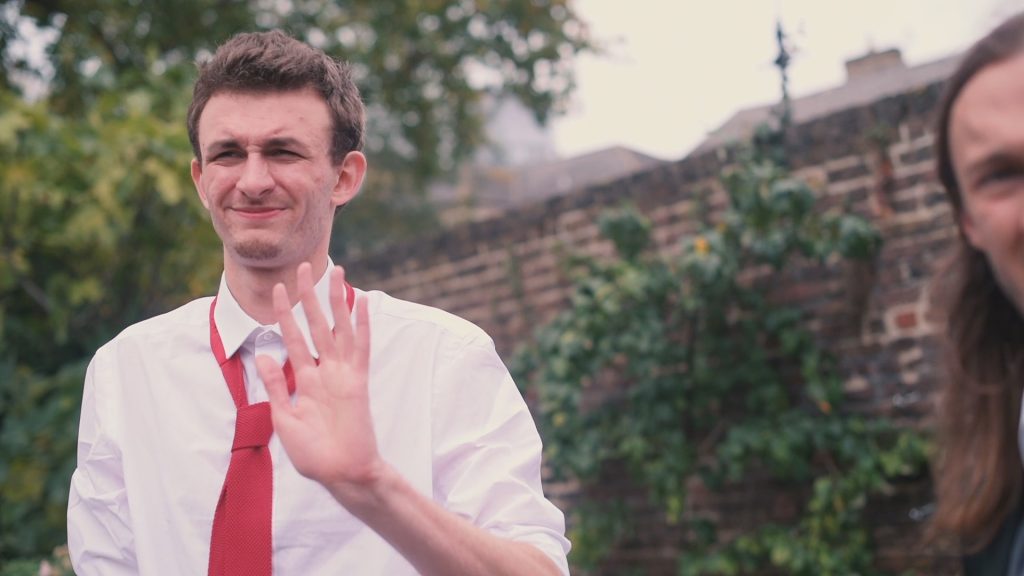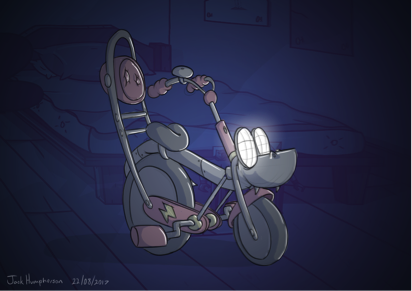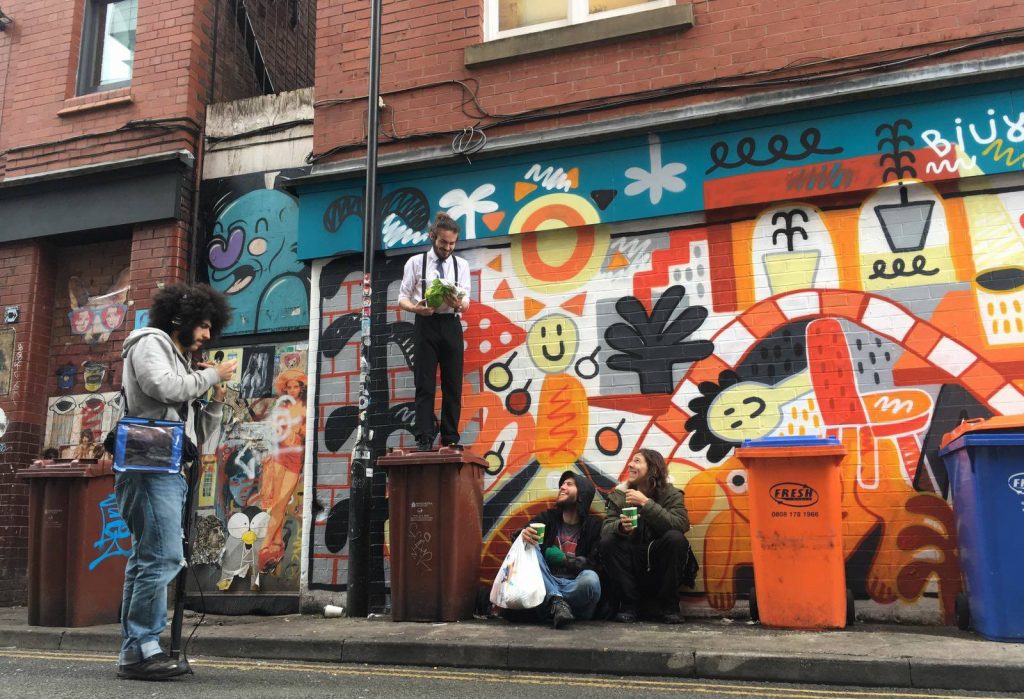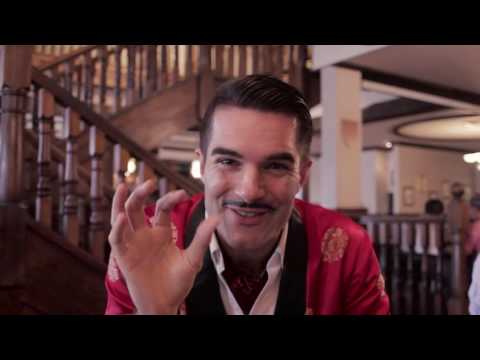By Peter Wright.
You’re about to go on a journey from horticulture to comedy commissioning… buckle up, it’s going to be quite a ride (or scroll to the bottom for a summary of what we learned).
Look out for:
– Vegetable violence advocated
– Analogy creep
– Pun based callback (capitalised for easy detection)
– Mild profanity x 2
– Unnecessary timestamping
It is 11am. You are sat alone in a small, white walled room. It is featureless barring a table, sat upon which are two plates containing items that will be your focus for the next five minutes. To your left, adorning one plate, is a deep red, succulent radish. Raw. Its bulbous shape is pleasant, almost relaxing. It exudes radishy virtuosity.
To your right, another plate, another vegetable. This time a potato. Perfectly oval, unblemished. Uniformly tanned. When nudged it returns to its previous position with grace. Upon nudging it again, perhaps by accident perhaps not, you expect it to cus in your direction. But no… it is unflappable.
Two prized specimens. Your task is to pick a winner. Voluptuous radish or sturdy potato.
What criteria do you use to judge this contest? Both are patently vegetables, with a simple shared purpose. But they are intrinsically different. What constitutes pure radishness is starkly different from optimum potatality.
It seems rational to start by assessing each against it’s breed standard, prodding and poking like a Crufts judge examining an unfortunate Schnauzer. We know already that these epitomise the ideal of their respective class. So how now to pick a winner? Could you factor in the utility and popularity of all radishes and potatoes? Surely then an average potato would have a fighting chance against a perfect radish. Is that a bad thing?
It’s tricky. You might even be questioning the point of it at this stage. Stop it, we’re not done with this yet.
There’s something else to consider. The attributes of our competitors can only impact the judging process to a limited extent. The rest is you.
If you are a signed up member of the Radish Appreciation Society how does this affect your judgement? Are you pre-disposed to seek the advancement of radishes amongst all vegatables, or do you cast a more exacting, critical eye over the radish, determined that it should not besmirch the reputation of radishkind? Maybe you are partial to neither. In which case do you waste no time pouring over intricacies and simply toss a coin, happy to remain ignorant to whatever it is others might find engrossing about radishes and potatoes?
Of course any sane human would enquire as to whether there was financial compensation for this obscure task, and upon receiving a reply in the negative would pick the potato (with the sound rationale that it could be used immediately as a more effective projectile or bludgeon against the lunatic who compelled them into the room in the first place).
What was all that about?
T’was a long winded and mostly unnecessary analogy to illustrate the difficulty of ranking things which are fundamentally different. It is impossible to remove bias when judgement is down to an individual or small group of individuals passing subjective opinion on creative work.
A History degree dissertation, the Man Booker Prize, FIFA Player of the Tournament. Horticulture. Comedy.
Like when we picked 5 winners from 270 comedy videos in this year’s Chorts! competition.
For the unacquainted, a Chort! is a short comedy video, maximum 2 minutes in length. Their purpose is to show off a comedy character or idea to gauge if it has potential for further development. They are designed to be quick to make and easy to watch, unlike the traditional approach of writing a full script. As long as it aims to be funny, is under 2 minutes and not grossly offensive, then anything goes, which produces a huge variety of vegetables comedy.
Like the modern primary school sports day it’s a competition with winners but no losers.
It’s about learning how to turn your idea into something people can experience and enjoy. And if they don’t, or if the execution doesn’t quite land, understanding how it could be better. We required every entrant to specify their target audience and encouraged them to go and test it with that audience and see how people respond. If their target audience don’t love it, then a set of judges outside of their audience definitely won’t.
We planned for 5 champions, who will each be guided through a process to take the next step towards making their Chort! into episodic comedy. We have expert advice and practical support primed in areas such as production, scripting, performance and audience building.
We needed a judging process but we weren’t so courageous or stupid to do it all ourselves. Last year we recruited fellow creators to help with narrowing down a shortlist, and then outsourced the picking of a single winner to a live audience at our screening event. This year we reached out to 5 experienced and influential contacts in the industry. This, we felt, would give the result real credibility. We sought diverse perspectives on our industry panel, mindful of the variety of vegetables and horticulturalists this competition attracts.
The problem with using an industry panel is that they are busy people, who wouldn’t appreciate a spreadsheet of 50, let alone 270, videos thudding into their inbox. We needed a shortlist. So we actually gave ourselves more work this year in creating that shortlist, a fact that became apparent as we watched with delight and then trepidation as double the number of the previous year’s entries rolled in.
270.
270 needed to be whittled down to 10.
Bugger.
At this point I should introduce the team tasked with this. Jon and I founded the Comedy Crowd having written a sitcom together. We share an a very similar comic taste. We are senior millennials, weaned on single camera realist comedy like The Office, The Royle Family and Peep Show. We are part of a demographic that has an innate, if largely unreasonable, suspicion about studio comedy. We have seen ‘When The Whistle Blows’ skewer so many that came before and, astonishingly, also came after it. We have to be persuaded that an accompanying laugh is that of a studio audience, and not a button press. We need creators to answer Dave Cohen’s rallying call and show us that studio comedy can be innovative and exciting again.
In the last year we have brought a new member to our team. Omar provides nothing of value except that he brings a new perspective – that elusive Welsh Bangladeshi voice that comedy has been crying out for. We were relying on him to check our bias. (I jest, Omar is part of an excellent comedy production company and brings valuable business experience. He also does law stuff).
We were well set to cast an eye over these entries that people had put so much effort into. Apart from having zero female, LGBT, non UK based, under 30 or over 40 perspectives we had everything covered.
The breadth of entries was spectacular. Animation, mockumentary, multi camera. Absurd, realist, satirical. Feminist, Conservative and even chefs.
The astute among you will have identified our problem. We were root vegetable men being asked to judge from a basket that included more beans and legumes than we were comfortable with. We were staring at the radish and sweating uncontrollably.
Having towelled ourselves down we decided to be explicit about our criteria. We decided shortlisted Chorts! must have 3 characteristics:
– Funny as a stand alone comedy
– Has potential for series development
– Identifies a strong target audience
We now had some structure to our thinking, but each of these criteria were still highly subjective.
To start the process of narrowing our shortlist we decided that we would come to a decision on each entry independently using a simple yes or no, red or green. With two or more ‘yes’ responses going through for further consideration. We strained to ensure that we didn’t look at each others’ responses on the master spreadsheet before watching a video, but from my perspective a combination of Excel ignorance and a laptop built for simpler times quickly thwarted that.
I had been on holiday during the first week of judging, and Jon had made laudable progress. As I opened the spreadsheet of comedy joy imagine my surprise to see a column amply seasoned with yellow. I assumed correctly that ‘M’ meant Maybe. There were lots of Maybes (Maybies / Maybe’s?). Bugger. This was going to be hard.
As I started making my way through the videos, I was determined not to succumb to uncertainty that had afflicted Jon. As much as this was subjective blah-de-blah, we had to make decisions with the best of intentions and have faith that this committee would pass horses rather than camels. That’s what I told myself.
Some of the Nos are easy. Not because they are terrible (very few are), but because I understood the style they were aiming for. They just fell short on writing, performance or production. These entries are usually fun to watch, and show great potential but, unlike other genres, pure comedy has to amuse. Not necessarily make you laugh, but you certainly have to smile. An inch is as good as a mile in this regard and if it doesn’t cross that line, it can’t be considered.
Other Nos are more difficult because I don’t understand or enjoy the style. I struggle to enjoy comedy that relies on being very absurd. In these cases I end up in a cognitive struggle trying to work out whether its me or the content that’s missing the point. Ideally we would have spoken to the target audience for these shows to get their perspective, but with 270 videos and needing to shower every few days that’s a challenge.
Some of the Yeses (Yes’s / Yesses?) are straightforward. I love a mockumentary well executed, so I can spot one (have a gander at this all you ‘This Country, Office, PJDN’ fans). Easy PEASy.
On other occasions something I thought was a certain Yes, received a blunt No from my less learned colleagues. We would battle that out later.
Then there were the Maybes. How am I qualified to judge a feminist animation aimed at the LGBT community, based in New Jersey? This is well executed and there’s certainly an audience for it, I’m just not it. This sort of thing kept happening, and my well intentioned ruthlessness was utterly blunted. Our Chorting spreadsheet became a scrolling sea of indecision.
It was time for a scrum down to end it all. Our team of three scheduled a meeting for a wildly optimistic single hour. What followed was three men fumbling around trying to create a gourmet menu with an eclectic range of ingredients, some of which they didn’t like or had never tasted. The resulting platter would be put in front of Michelin starred judges. You try weighing the merits of brilliantly executed comic poetry against a dark and original silent film. And what about diversity?! Someone had to bring it up. Did our shortlist adequately reflect the entries? Were we positively discriminating? We didn’t want to.
4 hours later we had our Chortlist. There were videos in there one of the three didn’t like. Perhaps naively we saw that as evidence that we had been pretty self reflective and gave ourselves a smug pat on the back. It’s just as likely that better content had missed out. Given our experience it was no shock that the industry judges, despite being very impressed with the quality of the shortlist, came to no unanimous decision about the best (the winners all received 3 out of a possible 5 votes).
One hugely encouraging result was that so high was the overall quality that we were able to create a 50 strong longlist that we are screening at 2 Chorts! Fest events in London in September.
Overall though, the experience made us vow to double down on our plans to create a better way to recognise great new comedy. Here’s what we’ve learnt in summary:
1. When decision making is about individual opinion, new voices miss out. What we experienced is a microcosm of the mainstream commissioning process for new creators. Commissioners are subjective. They will invest in pilots and audience research but each are imperfect, and a lot more effort than simply putting that money into an established name, which is what usually happens.
2. Niche comedy can thrive. The amazing variety of entries we received indicated to us that there is a huge range of voices and perspectives in comedy. You only have to listen to a two-bit observational comedian to know that relatability is a powerful comic tool. If you’re using it to tell a story that’s personal to a particular group, especially one that hasn’t been articulated before, then that is immensely powerful. You might not garner a huge audience, but you will have a devoted one. You only need 1000 true fans.
3. There should be no need for subjective decision making in deciding which shows get recognised and distributed. The smartphone allows creators to showcase their work in a compelling way and the internet with all its interest groups and forums allows them to find their audience. Original, exciting new comedy needs to stop trying to break in using the traditional system, and instead create a new one. That’s what we’re doing.
4. It’s pointless trying to compare a radish to a potato, there are enough people out there who love each.
If you’re interested in what we’re doing at The Comedy Crowd sign up to our mailing list and we’ll keep you updated with the latest developments as we build a new platform for exciting new comedy, judged only by its true target audience.





 I didn’t care that the recordings were a little inferior or the sets weren’t perfect. I didn’t even care that I bombed (a little… on track 5). It doesn’t matter that my very first album is not perfect because… it doesn’t have to be. Over 4-5 months I recorded over 20 sets across NYC. I chose my favorite seven tracks, my friend Marshall York recorded a song to close out the album (also cause “why not?”) and just like that… SILLY JOKES @ SORRY OPEN MICS is up on
I didn’t care that the recordings were a little inferior or the sets weren’t perfect. I didn’t even care that I bombed (a little… on track 5). It doesn’t matter that my very first album is not perfect because… it doesn’t have to be. Over 4-5 months I recorded over 20 sets across NYC. I chose my favorite seven tracks, my friend Marshall York recorded a song to close out the album (also cause “why not?”) and just like that… SILLY JOKES @ SORRY OPEN MICS is up on 

